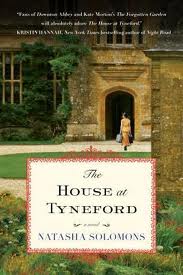Book Review: The House at Tyneford by Natasha Solomons
Book Review by Bud Gundy
I ripped through The House at Tyneford in a matter of
days. It was a beautiful read and I
admire Solomons' powerful descriptive gift.
I thought the story was quite good in many ways, and the emotional pull
was real.
I know many people who will love and cherish this novel, but
it veered dangerously close to romance for me – in that improbable and
unsatisfying way.
Elise is a 19 year-old Jewish girl whose family is forced
apart by the vicious anti-Semitism in Vienna
just before World War II. Her sister
departs to America with her
husband, while Elise heads to England
to work as maid at a country manor. Her gifted
parents are left behind, waiting for visas that will allow them move to New York .
The set-up is irresistible: Elise must learn to adapt to her
new life in greatly reduced circumstances.
While her parents were celebrated artists in Austria and she had grown used to a
life of finery, she has become just another servant for a wealthy but untitled
Englishman and his son in a great manor, complete with a Tudor wing.
Here, the story soared into a life-affirming testament as
Elise struggles with her reduced position, finding a very shaky but workable
balance.
The son Kip eventually becomes a love interest, and the
novel took a turn for the worse, at least for me. While individual scenes were incredibly fun
(especially a ball during which Elise and Kip scandalize the local gentry in
the only scene where I was rooting for them) the overall arc of the story
flattened until the inevitable war time conclusion to this doomed love affair arrived
with a thud.
After this point, I lost nearly all interest in the story
but kept reading because Solomons has an enormous, seemingly limitless power to
bring scenery and people to life. And I’m
happy I finished the book, because the revelation of Elise's father’s secret
(hidden in a viola) was a shocking and breath-taking metaphor that Solomons handles with incredible grace.
I feared this worthy book would become just another
hackneyed romance, but all in all, The House at Tyneford was worth the
read. If nothing else, the compelling
descriptions of life in the English countryside are worth your time.

Comments
Post a Comment